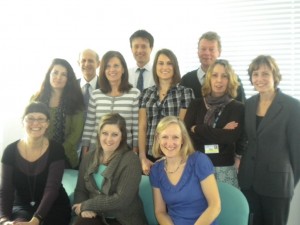Application deadline: 20 September 2012, by 4pm 
BBSRC’s FLexible Interchange Programme (FLIP) supports the movement of people from one environment to a different one to exchange knowledge/technology/skills, developing bioscience research/researchers and addressing our strategic priorities.
FLIP awards provide flexible opportunities for individuals (“the interchangers”) moving between different organisations, disciplines and sectors at all stages in their career beyond the PhD (or equivalent).
Awards
In the region of 10 awards will be made in the first year, building to 20 per annum over subsequent years.
Awards will typically:
- last up to 24 months
- cost up to £150k in total at 80% fEC
- be undertaken on a full-time, part-time or intermittent basis
- cover a contribution to the salary of the interchangers, reasonable travel and subsistence and costs associated with the interchange
Applications outside these ranges will be considered with full justification.

Scope
FLIP aims to:
- enhance opportunities for the exchange of knowledge, technology and people between the research base and user communities and vice versa for economic and/or societal benefit
- facilitate the development of partnerships to foster longer-term collaborations, thereby maximising the impact of previously-funded BBSRC research
- allow for an expansion of the skill base of individuals, particularly in emerging, niche and vulnerable areas alongside our strategic priorities
Eligibility
Each FLIP proposal will only have one lead academic applicant.
Lead applicant must:
- satisfy our standard eligibility criteria as described in BBSRC’s grants guide (see related links)
- be a named investigator on the awarded BBSRC research grant connected to the proposed interchange
Interchanger must:
- have a PhD (or for non-academics the equivalent professional experience)
- upon commencement of the FLIP award, be employed by one of the organisations participating in the interchange, such as a research organisation, UK industry, policy making or charitable organisation
How to apply
View the call text for full information. Complete the application form and mandatory attachments and submit via email as one single PDF document to FLIP@bbsrc.ac.uk.
Some applicants may be invited to attend a discretionary interview subsequent to the assessment of applications.
Application downloads
- Application form (DOCX 69KB)
- Call text (PDF 177KB)
- Help text (PDF 218KB)
- Frequently asked questions (PDF 120KB)
- Summary of financial contribution (DOCX 53KB)
- RCUK pathways to impact (PDF 87KB)
Assessment
Applications will be assessed at BBSRC’s Research Committee E meeting on 13-14 December 2012.
Interviews (if required) will be held from early January 2013.
Funding decisions will be announced by late January 2013 (dates are for guidance only and may be subject to change).
Contact
For eligibility, application process, deadlines and outcomes of applications: FLIP@bbsrc.ac.uk
For programme details:
Phillip Tait, Innovation Manager
phillip.tait@bbsrc.ac.uk
tel: 01793 442124
The RKE Operations team can help you with your application.

 The
The  UKIERI (UK-India Education & Research Initiative) is now accepting proposals for the following strand activities:
UKIERI (UK-India Education & Research Initiative) is now accepting proposals for the following strand activities:



 Dr Joanne Mayoh
Dr Joanne Mayoh





 Dr Lorraine Brown
Dr Lorraine Brown



 The first closing date for the BU Research Development Fund – Small Grants Scheme (RDF-SGS) is 31 October 2011.
The first closing date for the BU Research Development Fund – Small Grants Scheme (RDF-SGS) is 31 October 2011.











 New CMWH paper on maternity care
New CMWH paper on maternity care From Sustainable Research to Sustainable Research Lives: Reflections from the SPROUT Network Event
From Sustainable Research to Sustainable Research Lives: Reflections from the SPROUT Network Event REF Code of Practice consultation is open!
REF Code of Practice consultation is open! ECR Funding Open Call: Research Culture & Community Grant – Apply now
ECR Funding Open Call: Research Culture & Community Grant – Apply now ECR Funding Open Call: Research Culture & Community Grant – Application Deadline Friday 12 December
ECR Funding Open Call: Research Culture & Community Grant – Application Deadline Friday 12 December MSCA Postdoctoral Fellowships 2025 Call
MSCA Postdoctoral Fellowships 2025 Call ERC Advanced Grant 2025 Webinar
ERC Advanced Grant 2025 Webinar Update on UKRO services
Update on UKRO services European research project exploring use of ‘virtual twins’ to better manage metabolic associated fatty liver disease
European research project exploring use of ‘virtual twins’ to better manage metabolic associated fatty liver disease